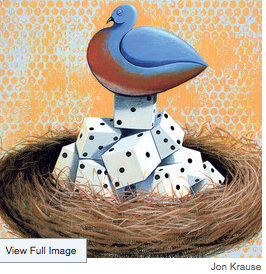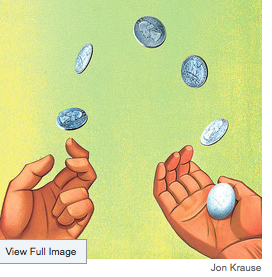Investing is an example of pari-mutuel betting. I discussed this topic in my last post, “Investing is Not the Kind of Gambling You Think! ” Pari-mutuel betting is based on human intelligence, not on probability or mere chance. This means the more you know about investing, the better your “odds” are for winning.
Economists and financial writers often are blissfully unaware of this difference.
They use the word “gambling” in relation to investing in inappropriate ways. They also refer to probability betting as if it applies to betting on the outcomes of activities involving living beings. It doesn’t. Probability betting applies only to inanimate objects like dice, cards, or spinning wheels. It doesn’t apply to the hand or mind that manipulates those objects.
So that you can see what I mean by this confusion, here’s an example from a recent issue of the Wall Street Journal. It’s from Sam Mamudi’s article on August 2, 2010 (pages R1 and R6). Mamudi’s title is “Try as Investors Might, So Much Depends on Chance.”
Use of the word “chance” is not the only wrong thing about this article. Right away we see images from probability betting in the two clever, professionally-shot, photos that accompany this article. One photo shows a bird on top of a pile of dice in a bird’s nest. The other photo shows coins being flipped by human hands.
As you’d imagine, Mamudi’s article addresses investing as a form of probability betting rather than a form of pari-mutuel betting.
Mamudi’s main point is that “chance” outcomes each year in the mutual fund market can greatly affect one’s retirement earnings. Depending when you accumulate your retirement funds, you might get less than you would have if you invested over a different time period.
Most of us can see that mutual funds don’t return the same amount every year. We also learn the hard way that funds that did well last year usually don’t do well this year. But this isn’t due to chance or luck.
There is a better explanation for the lack of consistency in fund returns. Mutual funds are managed by experts who know the most about financial markets. And these experts are competing to win the race every day. Yet these experts don’t know everything. They don’t know when company accountants are lying. They don’t know when or how a political event might affect a stock. They don’t know what the sentiment of other investors in the market will be in the morning.
Human fallibility is the reason we don’t have many winners in the mutual fund race who excel over time. Fund managers lose and have to learn from their own and each others’ mistakes. Fund managers win, and things change. The challenges they face then are new ones.
Mamudi’s title really should be, “Try as Investors Might, So Much Depends on Lack of Knowledge.” Now I’m not saying we can ever have perfect knowledge of everything. We’re human. I’m simply saying that our odds of success in pari-mutuel gambling are based on educated guesses not on chance. The stock market is complex. It’s affected by numerous and varied factors. Nobody can get it right all the time.
Investing is like betting on horse or dog racing
It is the same in investing as it is at the track. At the track, those in the know begin betting on the horses they think are most likely to win. The horses people bet the most money on to win are given the best odds of winning, e.g., 2 to 1. If a dark horse wins, (a horse with high odds of losing, e.g., 31 to 1), the payout to each of the winners is a lot bigger.
That’s because everyone put their money in the kitty, but only the few winners who chose the dark horse will need to split the money in the kitty among themselves. In a race where everyone put money on the same horse to win and that horse won, everyone would get only their own ticket money back – less a tiny amount taken out of each “tote” by the “track” to pay for its expenses. This is how pari-mutuel odds and payouts differ from odds and payouts in games based on chance.
With pari-mutuel betting, there is a fixed amount of money in the investing pot at any given time. This means at the end of the day, after the buying and selling stops, what one investor loses, another gains.
But the track itself never loses in pari-mutuel betting, and neither do mutual fund managers. They get their share of your bet no matter what happens to you. The only reason a mutual fund goes out of business is from poor financial management of the money it makes. Any business that doesn’t bring in customers and/or spends more than it makes over the long run, fails.
Fund managers who can’t compete with their peers will lose customers. Fund owners will either throw those managers out or demand they try harder to win the next year. That is the essence of competition in investing. Keen competition explains why individual funds will do well some years and not in others. Anyone who follows or bets on sports teams will see this phenomenon in action there too.
Luck is not the lady who oversees investing
In his article, Mamudi quotes Shlomo Benartzi, a business professor at the University of California, Los Angeles about the idea of “luck.” Says Benartzi, “We have an asymmetric view of good and bad luck. It’s well established that people attribute bad luck to randomness, but then attribute good luck to their own skill.”
The professor is correct. Ironically, Mamudi’s article makes this same mistake. Mamudi attributes bad luck in investing to chance. Mamudi claims that “chance” causes returns in the stock market to vary from year to year. He is well-intentioned. He’s warning you that you can get less than you expect for your retirement. Which is true. But his mistaken notion this is due to “chance” or “luck” leaves you feeling utterly powerless to change the outcome of your investing.
While the outcome of probability betting games does depends on “luck” rather than skill, this isn’t true for pari-mutuel betting. (This confusion about probability betting comes mainly from casino-type gambling where there can be an element of skill as well as luck involved- more about this in a future post). However, investing is a pari-mutuel “betting game” where investors pit their knowledge and skill against each other. Skill trumps luck in investing.
For example, those investors have an edge who know about studies which show mutual fund returns tend not to outperform “the market” (i.e., the returns of a major stock market index such as Standard & Poors 500.)
If sensible, these investors won’t waste time and money repeatedly chasing after vanishing phantoms of huge returns from mutual funds. They will plan for retirement with an investing strategy based on knowing the average fund return they can expect to get over the long haul.
For example, if the S&P is returning an average of 6 or 8 percent a year over the long-term, investors in S&P-type companies and mutual funds should assume they’d being do well to get that percentage on the total of their investment and compound interest upon retiring.
That means really watching those fund fees! (See my previous three part series “Fees in a Mutual Fund Prospectus.“) If your fund and/or broker fees leave you with a 3% return over 30 years, you will indeed find you haven’t made anything like what you hoped. You’ll barely have managed to keep up with inflation!
Copyright © 2010 Nancy K. Humphreys
Next time: Why Investment Scams Work


0 comments ↓
There are no comments yet...Kick things off by filling out the form below.
Leave a Comment